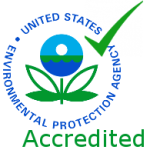
Individuals seeking recertification as a Lead Risk Assessor must be recertified before your current certification expires if you wish to continue conducting lead-based paint activities. Certification as a Lead Risk Assessor allows individuals to conduct on-site investigations to determine the existence, nature, severity, and location of lead-based paint hazards. The Lead Risk Assessor refresher training course provides information on lead-based paint investigation and reporting results and options for reducing lead-based paint hazards.
Courses have limited space. Register now to guarantee your enrollment!
Available Courses
Nothing Found
It seems we can’t find what you’re looking for. Perhaps searching can help.
About
Course Objectives
The purpose of this course is to train individuals conducting risk assessments on methods and procedures including:
- Identifying sources of lead contamination
- Visual inspection to identify lead-based paint hazards
- Sampling techniques
- Clean-up and clearance
- Results interpretation
- Lead-based paint hazard evaluation
- Control option recommendation and reporting
Syllabus
EPA Lead Risk Assessor Certification Refresher Course Overview
- Role and responsibilities of a risk assessor.
- Collection of background information to perform a risk assessment.
- Sources of environmental lead contamination such as paint, surface dust and soil, water, air, packaging, and food.
- Visual inspection for the purposes of identifying potential sources of lead-based paint hazards.
- Lead hazard screen protocol.
- Sampling for other sources of lead exposure.
- Interpretation of lead-based paint and other lead sampling results, including all applicable Federal or State guidance or regulations pertaining to lead-based paint hazards.
- Development of hazard control options, the role of interim controls, and operations and maintenance activities to reduce lead-based paint hazards.
- Preparation of a final risk assessment report.
FAQ
Frequently Asked Questions
Additional education, experience and training requirements to become a Lead Abatement Supervisor?
Lead-Based Paint Risk Assessor
- Pass an accredited inspector course.
- Meet one of the following requirements:
- Bachelor’s degree and one year of experience in a related field;
- Associate’s degree and two years of experience in a related field;
- A high school diploma (or equivalent), and at least three years of experience in a related field; or
- Certification as an industrial hygienist, professional engineer, registered architect and/or certification in a related engineering/health/environmental field.
Who administers the lead-based paint activities program?
EPA administers the lead-based paint program only in areas where states, territories or tribes are not authorized by EPA to operate their own lead abatement programs. The states administered by EPA include: Alaska, Arizona, Florida, Idaho, Montana, Nevada, New Mexico, New York, South Carolina, South Dakota, and Wyoming or American Samoa, Guam, the Northern Marianas and Tribal Lands.
All other states have EPA-authorized lead-based paint programs. Additionally, the Cherokee Nation, Lower Sioux Nation, Upper Sioux Community, and Bois Forte Band have EPA-authorized lead-based paint programs.
Reviews
Customer Reviews
Instructor answered all questions asked!! He did a great job and used real world examples.
I found Steve very informative and helpful.
Very informational. Instructor kept it interesting.
I liked the clear and concise instruction.
The lead training certification class was very informative and the instructor was very knowledgeable. I would recommend it.
